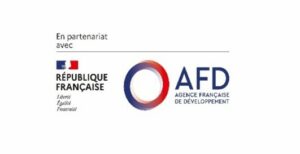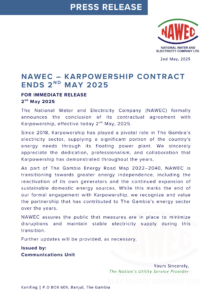


JOINT PRESS RELEASE
For Immediate Release
Government of The Gambia, NAWEC, and the French Development Agency Launch Major Water Supply Project in the Greater Banjul Area
Sifoe, 17th May, 2025 – The Government of The Gambia, through the Ministry of Petroleum, Energy and Mines and The National Water and Electricity Company (NAWEC), in partnership with the Agence Française de Développement (AFD) – the French Development Agency – will officially launch the Water Supply Project in the Greater Banjul Area (WASIB) on Saturday, 17th May, 2025, in Sifoe.
The launch event will be graced by His Excellency Mr. Adama Barrow, President of the Republic of The Gambia, along with senior government officials, dignitaries, development partners, and a cross-section of Gambian society.
This transformative initiative aims to significantly improve access to clean and reliable water for the rapidly growing population of the Greater Banjul Area. It is part of the government’s broader strategy to ensure sustainable water supply and meet national development and public health goals.
The WASIB project includes the following key components:
- Rehabilitation and construction of new water storage tanks
- Replacement of outdated transfer pumps and control systems
- Replacement of bulk water meters
- Drilling of 12 shallow and 4 deep Sand Aquifer boreholes
- Construction of a new 500m³ water treatment plant in Sifoe
- Expansion of water transmission lines and elimination of bottlenecks
- Construction and full equipment of a modern Water Quality Laboratory
- Development of a centralized Supervisory Control and Data Acquisition (SCADA) Center
- Extension of water distribution mains across greenfield and brownfield areas, covering over 300 km
Speaking ahead of the launch, Mr. Gallo Saidy, Managing Director of NAWEC, stated,
“The launch of the WASIB project is a bold step toward our commitment to ensure universal access to safe drinking water. Together with our development partners, we are building a water infrastructure that will serve communities for generations.”
The project is being implemented by a consortium of contractors comprising of RAZEL BEC, RAZEL Water Solutions, and SATELEC, with technical supervision provided by a consortium of consultants including Antea France, SGI Ingénierie, WATURA, and GAP Consultants.
This initiative marks a significant milestone in the modernization of The Gambia’s water sector and underscores the value of international cooperation in supporting national development priorities.
Contact:
NAWEC Corporate Affairs Office
Email: bbadjie@nawec.gm
Tel: 3664112 or 7415675
(Ministry of Petroleum, Energy and Mines Communications unit
Email: valentine.annamarie@gmail.com
Tel: 3709218 or 9736758














